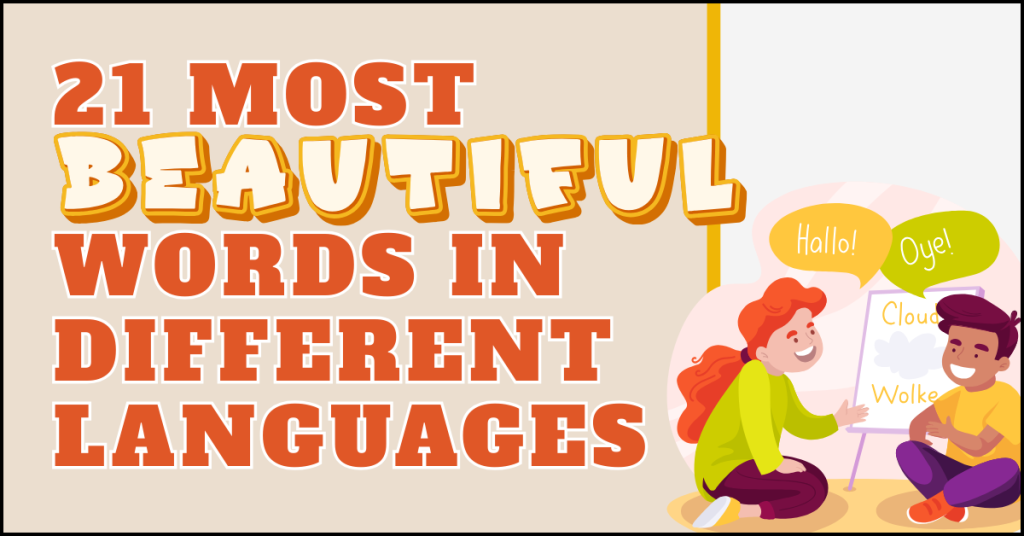Have you ever encountered a perfectly poetic foreign word you almost didn’t want to translate? That’s the magic of language. Some words carry depth, emotion, or visual beauty that your native tongue can barely scratch.
This article explores the most beautiful words in different languages. The kind that don’t just mean something but make you feel something.
By the end of this guide, you won’t just know 21 new words. You’ll also learn to make them part of your vocabulary toolkit. Whether you’re a language learner, a word nerd, or someone who wants to impress at dinner parties, there’s something here for you.
Let’s get into it.
What are the most beautiful words in different languages?
Language is a window into how people think, feel, and live. The most beautiful words in different languages are often untranslatable, packed with cultural nuance, and deeply emotional. Below are 21 such words, each explained with context and artistic insight.
1. Lagom (Swedish)
Lagom is the Swedish philosophy of balance, meaning “not too much, not too little—just right.”
It’s not about moderation out of compromise but choosing “enough” as a lifestyle. In Sweden, Lagom influences everything from interior design to work-life balance. It rejects excess and embraces sustainability and simplicity.
2. Gigil (Tagalog)
Have you ever felt an overwhelming urge to pinch or squeeze something unbearably cute? That’s Gigil. This Filipino term captures that intense, almost uncontrollable feeling of affection toward adorable beings. It’s a testament to the expressive nature of Tagalog.
3. L’esprit de l’escalier (French)
With its literal translation of “staircase wit” or “afterwit” , this phrase describes the predicament of thinking of the perfect retort too late. It’s that frustrating moment when the ideal comeback dawns on you only after leaving the conversation—a nod to the wit and depth of French expression.
4. Abbiocco (Italian)
That drowsy, content feeling after a hearty meal? Italians call it Abbiocco. The pleasant sensation of sleepiness envelops you post-feast, especially after indulging in rich, delicious food. It reflects Italy’s deep appreciation for culinary delights.
5. Komorebi (Japanese)
Komorebi refers to the delicate interplay of light and leaves when sunlight filters through trees. This poetic term captures a serene, ephemeral beauty often observed in nature. It showcases the Japanese sensitivity to fleeting moments.
6. Merak (Serbian)
Merak is the feeling of bliss and the sense of oneness with the universe that comes from simple pleasures. Whether it’s enjoying a cup of coffee or listening to a favorite song, it’s about savoring the moment.
7. Ya’aburnee (Arabic)
With its literal translation of “you bury me”, this word is a declaration of hope that one will die before a loved one because living without them would be unbearable. It encapsulates profound love and the depth of human connections, a poignant expression in Arabic-speaking cultures.
8. Yuánfèn (Mandarin)
Yuánfèn refers to the mysterious force that binds two people together in a relationship, akin to destiny or fate. It’s the serendipitous connection that brings individuals into each other’s lives. A concept deeply rooted in Chinese philosophy.
9. Hiraeth (Welsh)
Hiraeth conveys a deep longing for a home that one cannot return to or never was. It’s a mix of nostalgia, yearning, and melancholy for the lost places of your past. It’s a word that resonates with the Welsh soul.
10. Amor Fati (Latin)
Translating to “love of fate”, amor fati is about embracing everything that happens in life, including suffering and loss. It’s about seeing every experience, good or bad, as necessary and valuable—a philosophical stance championed by the Stoics.
11. Elysian (Greek)
Derived from Elysium, the mythical paradise where heroes reside after death, Elysian describes something divinely inspired or blissful. It’s the epitome of idyllic beauty and serenity. It’s a term that evokes the grandeur of ancient Greek mythology.
12. Ailyak (Bulgarian)
Ailyak is the art of doing everything calmly and without rushing while enjoying the process and life. It’s about taking the time to savor life’s moments without stress, reflecting the Bulgarian approach to a relaxed lifestyle.
13. Guanxi (Mandarin)
Guanxi refers to the system of social networks and influential relationships that facilitate business and other dealings. It’s about building connections and mutual obligations, a fundamental concept in Chinese society and business culture.
14. Ikigai (Japanese)
Ikigai is the reason for being. The thing that gets you up in the morning. It’s the intersection of what you love, what you’re good at, what the world needs, and what you can be paid for. It’s a guiding principle in Japanese life philosophy.
15. Jijivisha (Hindi)
Jijivisha is a Sanskrit-rooted Hindi word expressing a life-affirming force far more profound than survival. It refers to an unyielding desire to live, not just biologically, but fully—with purpose, curiosity, and enthusiasm.
In Indian philosophy, jijivisha is also seen as a spiritual yearning to connect, evolve, and live meaningfully.
16. Desbundar (Portuguese)
Desbundar is a Portuguese verb that means to “let loose” or “let go”, especially in a joyful, expressive, and carefree way. It’s closely tied to releasing social or emotional constraints and allowing oneself to experience freedom, pleasure, and spontaneity without guilt or restraint.
It originated in the Brazilian counterculture of the 1960s and 70s, where it became associated with living authentically and celebrating life without fear of judgment.
17. Douleur Exquise (French)
This phrase translates to “the exquisite pain” and the heartbreak of wanting someone who doesn’t or can’t reciprocate your feelings. It’s a poetic way of acknowledging that pain can be beautiful when tied to deep longing. French has a way of making even heartbreak sound elegant.
18. Kilig (Tagalog)
Kilig is the fluttery, giddy excitement you feel when something romantic or cute happens, like a crush smiling at you. That thrilling rush of emotions makes your heart skip a beat.
19. Meraki (Greek)
Meraki means to put a piece of your soul, creativity, or love into your work. Whether it’s cooking, writing, or decorating, it’s about doing something with passion and full attention. It represents heartfelt dedication, something deeply valued in Greek life.
20. Тоска (Russsian)
Toska expresses a deep, aching spiritual anguish, sometimes with no specific cause. Vladimir Nabokov described it as a great longing, sorrow, or nostalgia sensation. It’s a dense emotional word that reflects the complexity of the Russian soul.
21. Ukiyo-e (Japanese)
Originally referring to a genre of woodblock prints, Ukiyo-e means “pictures of the floating world”. It speaks to life’s fleeting, transient beauty, joys that drift by like clouds. It reminds us to appreciate beauty in impermanence, a central idea in Japanese aesthetics.
How To Learn New Words From Different Languages
Learning foreign vocabulary doesn’t need to feel like a homework assignment. Finding a method that keeps you engaged, fits your routine, and builds absolute memory retention.
Whether you aim to use the most beautiful words in different languages in everyday speech or want to appreciate their meaning, the methods below can help.
- Web-based Vocabulary Training Platform
One excellent option is the Lingo War. This browser-based game offers short, engaging challenges that improve word knowledge through repetition and focused practice.
With no downloads or account setup required, you can start playing immediately and track your progress with an integrated score dashboard. The game adapts its difficulty as you progress, and sessions are brief, making it a perfect fit for a busy schedule.
If you prefer doing it over passive studying, LingoWar is worth trying. It’s entirely free and works from any browser.
- Language Learning Apps
Apps like Duolingo, Babbel, or LingQ make vocabulary stick by integrating it into short, game-like lessons. They’re ideal for learning context, pronunciation, and basic grammar while introducing new words.
Apps are perfect for daily use, especially if you’re commuting, waiting in line, or bored during a commercial break. Most apps cover vocabulary, pronunciation, grammar, and even cultural insights all in one place.
- Read Language-specific Dictionaries or Books
A good bilingual or monolingual dictionary introduces you to the actual vocabulary used in context. For example, diving into a French dictionary might uncover expressions like “douleur exquise” or “l’esprit de l’escalier” that you won’t find in introductory textbooks.
Some books explore the nuance and story behind words, turning dry definitions into memorable insights. Keep a dictionary nearby, whether physical or digital, and explore it like a treasure hunt.
- Create Physical Flashcards
Don’t underestimate the power of pen and paper. Writing things by hand has been shown to improve memory retention compared to typing. Group your flashcards thematically by emotions, nature, and relationships so your brain creates mental connections faster.
Want to go one step further? Add a drawing, a synonym, or a short sentence to the back of each card.
- Use Mnemonics
Mnemonics help tie abstract foreign words to images, stories and sounds you already know. For instance, associate the French word “douleur exquise” (the pain of unrequited love) with a scene from a romantic film. The quirkier the connection, the better your brain holds onto it.
- Movies and TV shows
Language immersion doesn’t have to involve moving abroad. Watch foreign films or series with subtitles in the original language. Hearing the words in context alongside expressions and gestures helps reinforce memory and usage. Bonus: You can pick up pronunciation and cultural context simultaneously.
Benefits of Learning New Words in Different Languages
Improved Cognitive Abilities
Learning new words and phrases exercises your brain in powerful ways. More often than not, bilingual individuals have sharper cognitive skills, better memory, and improved concentration. Each new word you learn creates neural pathways that keep your brain agile, boosting overall mental clarity and problem-solving skills.
Expanded Cultural Awareness
Every language comes loaded with cultural nuances. Learning words like ikigai (Japanese for life purpose) or ya’aburnee (Arabic for deep love) deepens your understanding of other cultures’ values and perspectives.
Greater Professional Opportunities
A broader vocabulary from multiple languages opens doors in your career. Multilingual professionals are in high demand, and surveys indicate that companies often pay higher salaries to candidates who can navigate various languages.
Your knowledge signals flexibility, adaptability, and cross-cultural communication skills to potential employers.
Builds Confidence
Each new word you learn and remember boosts your self-belief. It’s proof of progress, and the more vocabulary you collect, the more empowered you feel to use it in real situations, whether that’s a conversation, a trip abroad, or writing creatively.
Boosts Emotional Awareness
Languages express feelings in ways that shape how we understand ourselves and others. Learning foreign vocabulary helps you tune into subtle emotional states, improve your interpretation of conversations, and deepen your ability to empathize.
Makes Travel More Meaningful
Understanding even a few words in a local language transforms how you experience a place. You engage more deeply, make real connections, and pick up on nuances tourists often miss. It turns travel into cultural immersion rather than observation.
Tips for Learning New Words in Different Languages
Learning new words doesn’t have to feel like a grind. These simple strategies can help you make faster progress and enjoy the process:
- Focus on relevance: Start with words you’re likely to use in daily life or that resonate emotionally. They’ll stick better and feel more rewarding.
- Use them in context: Don’t just memorize. Use new words in a sentence, journal entry, or conversation. It builds long-term retention.
- Review regularly: Spaced repetition is key. Revisit new vocabulary at increasing intervals to keep it fresh in your mind.
- Practice out loud: Saying words aloud improves pronunciation and reinforces memory through multiple senses.
- Mix tools: Combine games (like Lingo War), apps, flashcards, and media to stay engaged and avoid burnout.
Final Thoughts
Languages carry emotion, history, and worldview inside their words. Some of them are unforgettable. Expanding your vocabulary across languages helps you connect to ideas and experiences that English can’t always capture.
You don’t need hours of study or expensive courses to start. With the right tools, consistent habits, and a bit of curiosity, you can bring these expressions into your daily life.
Whether you’re drawn to words that capture joy, longing, or purpose, the journey of learning them is as enriching as the words themselves. So, play a quick game, watch a foreign film, or write down a few new words each week. Small steps lead to lasting knowledge.



